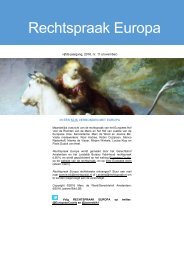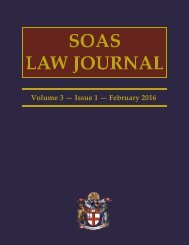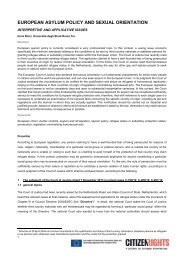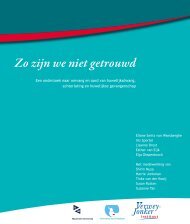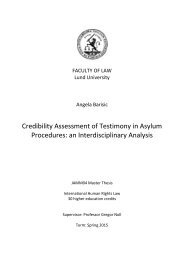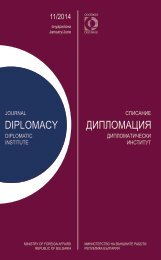AEMI
AEMI-2016-web
AEMI-2016-web
Create successful ePaper yourself
Turn your PDF publications into a flip-book with our unique Google optimized e-Paper software.
146 <strong>AEMI</strong> JOURNAL 2015<br />
In the interviews19 both organizations<br />
state that organizing ‘roots travels’ is<br />
one of the most important activities of<br />
their organization. Adoptees who want<br />
to search for their biological family can<br />
sign up for a ‘roots travel’ and during<br />
their search they receive assistance in<br />
order to find their biological families<br />
and travel with the organization and<br />
other adoptees to their country of birth<br />
to meet their family. UAI is another organization<br />
which makes itself heard on<br />
the position of adoptees by criticizing<br />
the adoption market and its tendency<br />
towards child trafficking. According<br />
to Nicolas Yoon Gelders of the UAI,<br />
the supply in the ICA market is dwindling,<br />
while the demand is rising 20 .<br />
This results in a massive pressure on the<br />
sending countries to meet the demand<br />
and therefore corruption plays a big<br />
role on the ICA market. The financial<br />
incentives involved in the ICA market<br />
stimulate corruption. As Westra of the<br />
UAI explains: ‘The intercountry adoption<br />
market is full of corruption. Especially<br />
on informal corruption there is no<br />
control and therefore children are easy<br />
victims of child trafficking practices’. 21<br />
(Prospective) Adoptive Parents<br />
As already mentioned, prospective parents<br />
are responsible for the high demand<br />
for young adoptable infants. Therefore,<br />
‘prospective parents continue to contribute<br />
large sums of money into a potentially<br />
corrupt system in order to find<br />
adoptable children abroad’ (Herrmann,<br />
2010:417). Not all prospective parents<br />
are aware of the existence of corruption<br />
and have this misconception that orphanages<br />
in underdeveloped countries<br />
contain an endless supply of healthy<br />
infants (Ibid.: 412, 427). In addition,<br />
adopting a child is an emotional experience<br />
for prospective parents and the immense<br />
need for getting children makes<br />
them not want to look to practices that<br />
do not seem to be totally legal.<br />
Once they have become adoptive<br />
parents and a scandal is revealed with<br />
disturbing news about their little ones,<br />
adoptive parents can only say in their<br />
defense that they trusted their adoption<br />
agencies. Graff gives an example<br />
of an American mother who adopted<br />
a little Cambodian girl and her adoption<br />
agency told her that her Cambodian<br />
daughter was an orphan. However,<br />
when her daughter could speak English<br />
well enough after a year, she spoke about<br />
her mommy and daddy and her brothers<br />
and sisters, all of which have been<br />
found to be alive (2008:65).<br />
In short, adoption agencies and (prospective)<br />
adoptive parents have motivations<br />
to ignore evidence of child<br />
laundering practices. Nonetheless, this<br />
is becoming increasingly apparent in the<br />
ICA system, and the patterns are obvious<br />
for those with eyes willing to see. Thus,<br />
‘credulous Westerners, eager to believe<br />
that they are saving children, are easily<br />
fooled into accepting laundered children<br />
-- for there is no fool like the one who<br />
wants to be fooled’ (Smolin, 2005:135).<br />
Biological Parents<br />
Scholars have been dealing with the<br />
well-being of adoptees or with the position<br />
and demand of prospective parents<br />
in the ICA market. Unfortunately, there<br />
is a lack of research about the position of<br />
the adoptees’ biological parents in this<br />
demand-driven market. Herrmann and<br />
Kasper (1992) argue that the mere ac-



